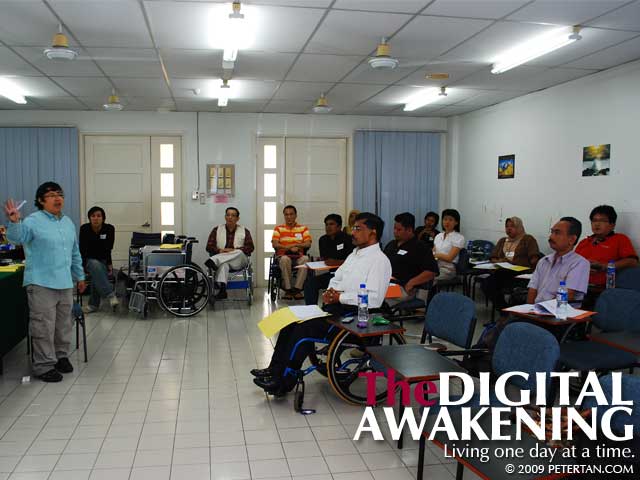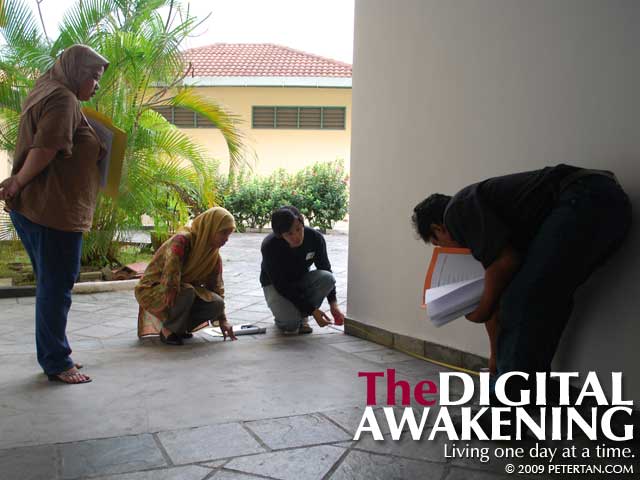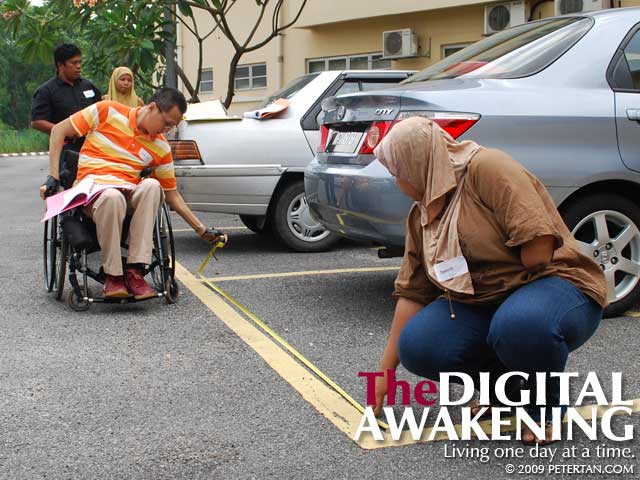Press Release: Human Rights Day 2010: “Against All Odds”
Thursday, 09 December 2010 10:40amOn 10 December this year, the Bar Council Human Rights Committee once again joins the rest of the world in celebrating Human Rights Day.
Our focus this year is on the rights of persons with disabilities.
Malaysia recently ratified the Convention on the Rights of Persons with Disabilities (“CRPD”). While the Malaysian Bar welcomes this move, there are still grave concerns on the Government’s reservations to Article 3 on general principles, Article 5 on equality and non-discrimination, Article 15 on freedom from torture or cruel, inhuman or degrading treatment or punishment, Article 18 on liberty of movement and nationality, and Article 30 on participation in cultural life, recreation, leisure and sport.
Malaysia has also not signed or ratified the Optional Protocols of CRPD, which grant specific rights to the citizens/residents of a country to refer their government to the international supervisory committee for non-compliance with any of the articles.
Locally, the Persons with Disabilities Act 2008 has yet to be amended to provide for any form of punishment or remedy for breaches.
These are fundamental issues that need to be addressed, to give full force and effect to the CRPD, without which the rights of persons with disabilities in this country are not even close to being fully acknowledged, what more protected.
Aimed at raising public awareness on rights of persons with disabilities, “Against All Odds” will feature a Public Forum on Persons with Disabilities Act 2008 that will take place on 12 December 2010 (Sunday) from 2:00 pm to 5:00 pm at the Bar Council Auditorium, No 15, Leboh Pasar Besar, 50050 Kuala Lumpur.
Invited panellists, and the topics of discussion, are:
(a) Professor Dr Tiun Ling Ta, President, Persatuan Orang Cacat Anggota Malaysia: “Opportunities in education – early, primary, secondary and tertiary”;
(b) Zakaria b Yahaya, Teacher, Sekolah Menengah Pendidikan Khas Setapak, Kuala Lumpur: “Observation and expectation from the vocational and recreational perspectives”;
(c) Helen Chin, advocate and solicitor: “Malaysia’s ratification of the UN Convention on the Rights of Persons with Disabilities and human rights for the disabled community in Malaysia”;
(d) A representative from the Human Rights Commission of Malaysia (SUHAKAM) (TBC): “Commitments by the government ministries and agencies”; and
(e) A representative from the Ministry of Women, Family and Community Development (TBC): “Enjoying life from human rights perspectives”.The forum will be conducted in both Bahasa Malaysia and English.
After a successful inaugural event in 2008, the Bar Council Human Rights Debate is now being featured again in conjunction with the Human Rights Day celebrations. It is a three-day event that will be held from 10-12 December 2010 (Friday to Sunday) at KDU University College, Section 13 Campus, No 76, Jalan Universiti, Petaling Jaya, Selangor.
Aimed at promoting free speech and creating greater awareness and education of human rights standards, while at the same time advocating important principles of international rights law, the theme for this year’s Human Rights Debate is “Against All Odds – Making a Difference for Human Rights”.
Out of RM30,000.00 prize money allocated from registration fees and corporate sponsorships, RM25,000.00 will be donated equally to five institutions caring or advocating for persons with disabilities from all over the country, to be selected by the Bar Council Human Rights Committee. The remaining RM5,000.00 will be awarded as prize money to the champion of the tournament.
Teams from 18 institutions, including some from India, Bangladesh, Philippines and Singapore, as well as local universities such as Universiti Malaya and Universiti Putra Malaysia, have registered for the tournament.
This is a unique debating tournament, the first in the world to be hosted by a statutory body of legal professionals.
Admission to both the public forum and the human rights debate tournament is free, and open to the public. Due to limited space, pre-registration is required in order to attend the public forum. To register, please contact Adi Irman by telephone at 03-2031 3003 ext 105 or by email at adi@malaysianbar.org.my.
Ragunath Kesavan
President
Malaysian Bar9 Dec 2010
Tag: Society of the Orthopaedically Handicapped Malaysia
Almost Over
The 2nd Regional Training of Trainers on Disability Equality Training (DET) ended today. Some of the participants have already left for home. I am missing them already. We spent so much time learning from each other in the eight days we were together. The 1st Regional Senior Disability Equality Training (DET) Trainers’ Training will conclude tomorrow. I am still here at MAKPEM in Bandar Baru Sentul waiting for Wuan to come pick me up.
I have to admit it has been a tiring two weeks but it was well worth the sleep deprivation and the time spent at the training. There were so many concepts to pick up, so many new presentation and facilitation techinques to learn and so many friendships forged. The camaraderie among the facilitators and participants was great. This must be one of the best trainings that I have attended.
On Saturday, I will be facilitating a half-day DET session for members of POCAM (Persatuan Orang-Orang Cacat Anggota Malaysia) with fresh skills learnt from this training. It is my fervent hope that more people will become aware of disability issues and that society at large and disabled people work together to resolve the multitude of problems that are disabling certain segments of the population from full and equal participation in Malaysia.
Importance Of Access Audit In Malaysia

Photo by Wuan.
The Persatuan Orang-Orang Cacat Anggota Malaysia (POCAM) through its Accessibility Committee headed by Elizabeth Ang organised an Access Audit Training for members of the association. The training was conducted by Naziaty Yaacob. She is the senior lecturer at the Department of Architecture, University of Malaya, and is very experienced in accessibility issues in the built environment.
I have been advocating for an accessible built environment and the Malaysian Standard MS 1184 in this blog for a while now but have never really gone into the details that go into making the infrastructure fully accessible. After the training, I realised that there were many issues that I have overlooked, especially the intrinsic details that makes a difference between endangering the lives and making public facilities safe.

Photo by Wuan.
The training was held at the Institut Latihan Majlis Kebajikan dan Pembangunan Masyarakat Kebangsaan Malaysia (MAKPEM) in Sentul. I have stayed there a once and had thought that the building was a good accessible model to duplicate as trainings for disabled people were often conducted there. It was only after the access audit exercise that we discovered a number of the facilities do not conform to the Malaysian Standard MS 1183 and MS 1184.
Accessibility is not only about ramps and toilets for wheelchair users. It is also not exclusively for disabled people. Society in general benefits from such facilities as they are safe and convenient to use. Take for example the staircase. Nosing with contrasting colour is important for indicating the edge of the steps. Wuan and I personally witnessed an elderly man falling down outside Metrojaya Bukit Bintang. He lost his footing walking unaware down an unmarked step. Fortunately he did not suffer any injury.

Photo by Wuan.
Access auditing is important in identifying barriers in the infrastructure that needs to be rectified. This will ensure that everyone has equitable use of public facilities. Malaysia still has a long way to go in this aspect. Most public buildings do not fulfil the requirements of the code of practice. This includes essential government facilities. Accessibility in the built environment is one of the two core issues affecting disabled people that has not been given due attention. The other is public transport.
The local authorities are the biggest culprit in this deplorable state of affairs as they have never seriously enforced By-Law 34A of the Uniform Building By-Law (UBBL 34A) requiring that buildings provide access for disabled people. The UBBL 34A has been in force since the 1990s. Fifteen years on, many new buildings still do not conform to MS 1184. As long as the various levels of government is not serious in resolving accessibility issues, disabled people in Malaysia will continue to be marginalized.
